lesson 3
新概念英语第一册(Lesson3)学习笔记-全
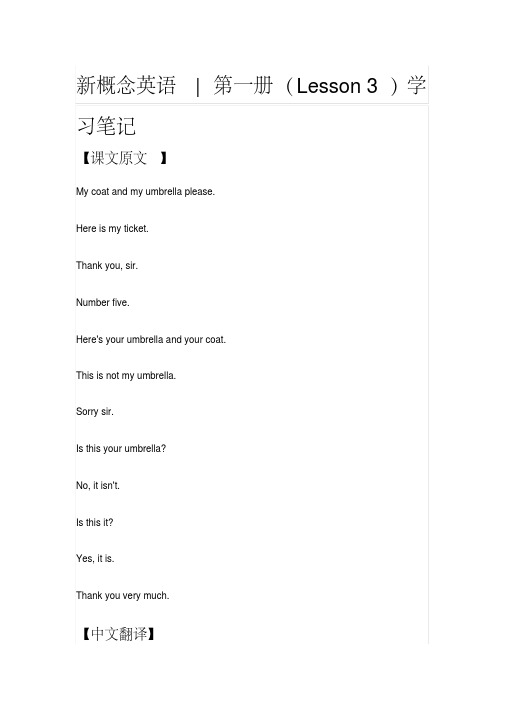
【课文原文 】
My coat and my umbrella please. Here is my ticket. Thank you, sir. Number five. Here's your umbrella and your coat. This is not my umbrella. Sorry sir. Is this your umbrella? No, it isn't. Is this it? Yes, it is. Thank you very much.
Here is my ticket
正常语序为:
my ticket is here.
例如:
Байду номын сангаас
Here is my father.
Here is my English teacher.
3.Thank you ,sir.
sir, 是英语中对不相识的男子、年长者或上级的尊称。在服务行业中,服务员对 男顾客的称呼通常为 sir:
【课文解析】
1 .My coat and my umbrella please. 请把我的大衣和伞拿给我。 这是一个省略形式的祈使句,完整的句子应为: Give me my coat and my umbrella, please. 口语中,在语境明确的情况下通常可省略动词和间接宾语, 如:(Show me your) Ticket, please. 请出示你的票。(Show me your)Passport, please. 请出示您的护照。 2.Here is my ticket. Here is =Here's Here is... 是倒装结构,即系动词提前到了主语之前。
新概念英语第三册:Lesson3重点句型解析

【导语】新概念英语⽂章短⼩精悍,语句幽默诙谐,语法全⾯系统。
适合各个阶层的⼈群学习参考。
相信有了新概念英语,你也可以成为“⼤神”级别的⼈物!还在等什么?快来加⼊学习吧!⼩编与您⼀起学习进步! 1、How did the archaeologists knowthat the statue was a goddess? Some time ago, an interestingdiscovery was made by archaeologists on theAegeanisland of Kea. some time 1>经过若⼲时间 2>在未来的某时 sometime adv.在某⼀时候,曾经, 有⼀天 sometimes adv.不时, 有时中⽂习惯⽤主动语态。
英⽂习惯⽤被动语态。
以事件、结果、影响、效果为主语,强调对客观事实的陈述。
An American team explored a temple which standsin an ancient city on the promontory of Ayia Irini. which引导定语从句,修饰限定temple。
(which = that) stand(不及物) = lie(不及物) 位于 =situate(及物) 使位于, 使处于 =locate(及物) 使...坐落于, 位于 whichstands in... = which lies in… = which is located in… = which is situated in... Stand 1>⾝⾼ 2>表⽰⾼⾼坐落于, 矗⽴于 -- She stands 1.75m. 她⾝⾼1.75 ⽶ --Agreattree stands on the mount. ⼀棵⼤树竖⽴在⼭上。
2、The city at one time must havebeen prosperous,forit enjoyed a high level ofcivilization. for引导原因状语从句:对主句的附加说明和解释,提供更多的信息。
[全]新概念英语第一册 Lesson 3详解
![[全]新概念英语第一册 Lesson 3详解](https://img.taocdn.com/s3/m/33d7b661b0717fd5360cdcef.png)
新概念英语第一册Lesson 3详解1. umbrella [ʌm'brelə] n.伞umbrella 伞;雨伞;阳伞I felt a few spots of rain so I put my umbrella up. 我感到有几滴雨点,于是便撑起了雨伞。
I left another umbrella on the bus yesterday. 我昨天又把一把伞落在公交车上了。
2. please [pli:z] int.请♥A. please/pli:z/感叹词;感叹语;感叹句exclamation1. used to make a request more polite 好吗,请(用于客气地请求)Could I have two cups of coffee and a tea, please? 给我来两杯咖啡、一杯茶好吗?Please remember to close the windows before you leave.您离开前请记住关上窗户。
2. used to add force to a request or demand 请,求求你(用于加强请求或要求的语气)Please, David, put the knife down. 求求你,戴维,把刀放下。
Oh, please. Do shut up! 好了,别说了!3. UK used especially by children to a teacher or other adult in order to get their attention 让我说(尤指儿童为引起老师或其他成年人的注意时的用语)Please, Miss, I know the answer! 我来说,老师,我知道答案!4. used when accepting something politely or enthusiastically 行,谢谢用于礼貌或热情地接受某物时"More beer?" "Please."“再来点啤酒?”“好的。
新概念英语第一册课件lesson3
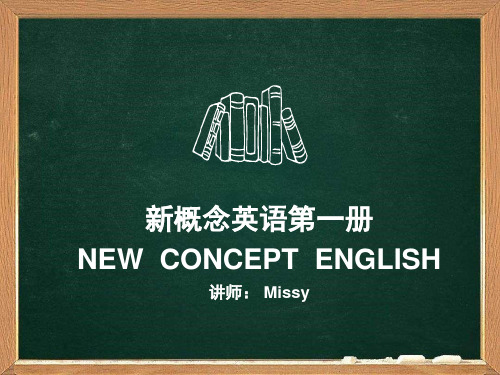
umbrella /ʌm'brelə/ n.伞
一把雨伞: an
umbrella
a /an 的用法
相同点:一...(件,把,张)
不同点:a 用于辅音音素开
头的单词前;an 用于元音音 素开头的单词前。
under the umbrella of......在...的保护下
eg.The boy is under the umbrella of the policeman. 男孩儿在警察的保护下。
This is my ticket.
This is not my ticket.
Is this it? Yes, it is.
it 在这里指代的是上文中的umbrella。 it 物它,可指事物,动物 he 他 指男性 she 她 指女性
Lesson 4 Is this your...?
单词讲解:
1. suit /su:t/ n.一套衣服 2. school /sku:l/ n.学校 3. teacher /'ti:tʃə/ n.老师 4. son /sʌn/ n.儿子(同音词sun) 5.daughter /'dɔ:tə/ n.女儿
Homework :
1.单词会读,会听写。 2.课文模仿语调大声朗读,并会背。 3.课本第7页对照图片练习对话。
Here is my ticket.
Here is my... 这是我的... eg: 这是我的钢笔。 Here is my pen.
my可以灵活运用哦 (his,her,your...)
Here's your umbrella and your coat .
=Here is 这里be动词采取“就近原则”
新概念英语 第一册 Lesson 3

字母u 或者o发[ʌ]
umbrella number sun up fun /funny lunch cover other
பைடு நூலகம்
cup bus shut much son money
[ʌ]
Well begun, half done. Well begun is half done. (良好的开始是成功的一半。)
小小绕口令
After dinner sit a while, after supper walk a mile.
单词重音
响亮的音节叫重读音节,不响亮的音节叫非重读音节或 弱读音节。如picture, 重读第一个音节,弱读第二个音 节。
读重读音节的时候,呼出的气流比较强,发音器官 的肌肉也比较用力,因此重读音节需要读得重而强;读 弱读音节的时候,胸腔肌肉用力小,呼出气流较弱。注 意;
the first picture.
[ə]
这是短元音,但发音长度并非是上一个的一半。 舌身平放,舌中部稍微抬起,但比前一个略低; 舌尖抵下齿龈;不要将双唇手圆了;发音时,唇、 舌和牙床都很自然,肌肉一点也不紧张;声带要 振动。
语音示范
er发[ə] worker teacher sister brother letter a发[ə] among about arrive along 其他发[ə] 的字母或字母组合 sugar doctor famous
英语中的每个单词在鼓励发音的时候都是有重音的。
因此,单音节词都要重读。
New words and expressions
Early bird catches the worm. 捷足先登
语音连接:巧分音节:一归后,二分开, 复印连缀不分开
新概念英语第二册lesson-3
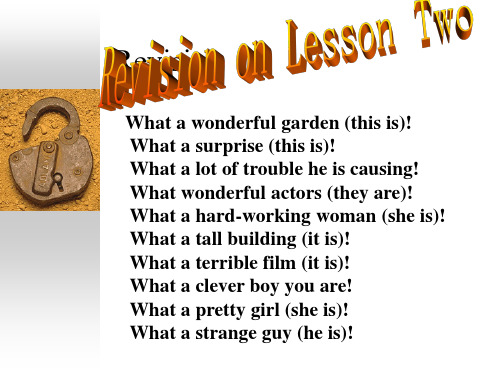
以上三个是指物理上的破坏, 而spoil主要指精神 上
Lend (lent) (lent ) v. 借出
lend sth.to sb=lend sb.sth. Can you lend 50 yuan to me? lend me your ears. 请听过我说。
public house简称pub : 酒吧 ; public place 公共场所. public lavatory ['lævətɔri】 公厕
in public:公开的; in private:私下里的 Let’s have a conversation in private. 让我们私下谈谈? Why not has a conversation in public? 为什么不公开谈呢?(当面说呢?)
Pair discussion!
Now, imagine you are having a trip overseas. And you only have 1, only 1, postcard. Who do you want to send to?
Now, everyone have 3 minutes to tell your partner. Let’s begin!
Germany German
Ireland Irish
Brazil
Brazilian
America American
Greece Greek
Canada Canadian
Australia Australian
新概念英语第一册 Lesson 3
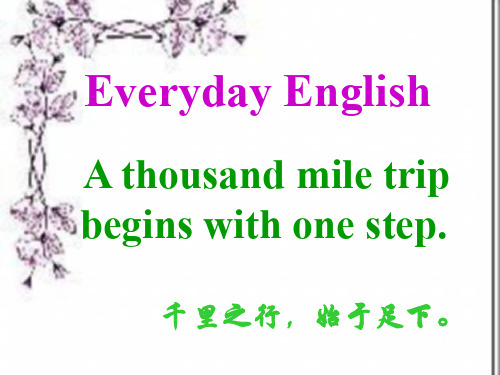
Write these with short forms :
Here is your pen . Here’s your pen . 1.Here is my ticket . 2.It is not my umbrella . 3.It is your umbrella . 4.It is my pen . 5.It is not my pen .
音标的学习
英语中的音标类似于汉语中的拼音,所 以学好音标后对英语单词的认读有很大 帮助。
音标简介 汉语中的拼音分为声母云母,而英文中
分辅音和元音。元音20个,辅音28个。 今天我们从简单的元音开始学习。
v
sunny lunch
duck but
[ ] jump fun
run hundred
一将那Isb般e是t疑动h问词她a句t提的。h前e含至车r有句吗cb首ea,动?r 句词?号的变陈问述号句,变用成升疑调问。句时, Yse, it is . No ,it isn’t .= No ,it is not .
Is this your umbrella ?
???
Yes ,it is .
那是你爸爸吗 Is that your father ? Yes , he is . No , he isn’t .
He has a daughter studying at harvard.
拉吉夫和索尼娅育有一子一女。
Rajiv and sonia had a son and a daughter.
伞 请 这里 我的 票 号码 五 对不起的 先生 衣帽
suit school teacher son daughter
Everyday English
lesson 3 课文翻译和词汇
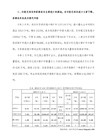
adversary ( n.) : person who opposes or fights against another;opponent敌手;敌方;对手 high-tail ( v.) :[colloq.]leave or go in a hurry;scurry off (chiefly in high-tail it )[口]匆忙离开,匆忙走开;迅速撤退;迅速逃走(主要用于high-tail it)
vacillation ( n.) :he state of wavering in mind;hesitation;indecision犹豫;踌躇 dally ( v.) :be slow or waste time闲荡;延误
bulge ( v.) :swell or bend outward;protrude or project膨胀,肿胀;鼓起,隆起,突出
unequivocal ( adj.) :not equivocal;not ambiguous;plain;clear不含糊的;不模棱两可的;明确的;明白的
新概念英语第二册 Lesson3 (共25张PPT)

• 3)decide / make up one’s mind 区 别
• decide 指经过考虑对疑难问题、争 端等做出决断,含有下决心取舍的 意思。decide 后常接动词不定式和 从句。
• make up one’s mind 指毫不犹豫的 做出决定,意味着“打定主意,下 定决心”。后常接动词不定式,一 般不接从句。
New words
1.send v. 送 派送 send sth. to sb. / send sb. sth 送给某人某物 nd a letter 寄信
send / take 区别: take 强调某人亲自送; take sth to sb 给某人送某物 send 则是通过第三人去送
与send搭配的常用短语
5.single 1)唯一的,单一的: 反义词 double
2)未婚的,独身的: 反义词 married 已婚的
• 6.postcard n. 明信片 卡片 • 有关card词组: • ID card身份证 • credit card信用卡
• 7.museum n. 博物馆 • 扩展: • the Palace Museum 故宫 • the Summer Palace颐和园 • the science museum 科学博物馆
现在进行时:
1.概念:表示现阶段或说话时正在发生的动作或行为。
2.结构:肯定句: 主语+ am/is/are + Ving + 其他. 否定句: 主语+ am /is/are +not + Ving + 其他. (1.在am/is/are后加not. 2.some → any)
一般疑问句:Am/Is/Are+主语 +Ving + 其他 ?
新概念英语第二册课文Lesson3
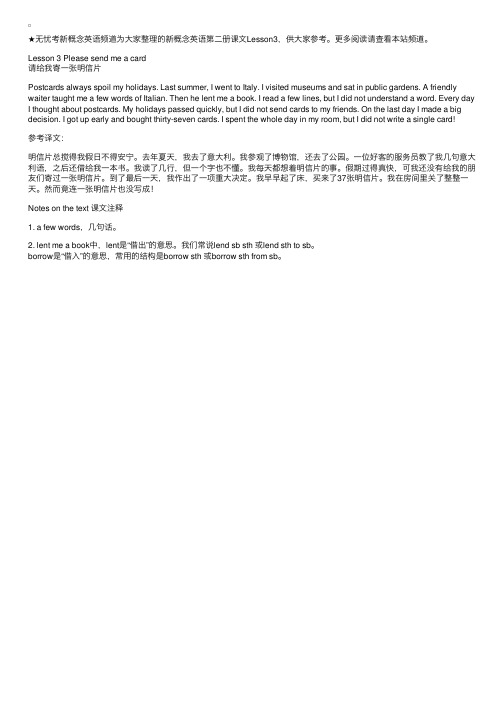
★⽆忧考新概念英语频道为⼤家整理的新概念英语第⼆册课⽂Lesson3,供⼤家参考。
更多阅读请查看本站频道。
Lesson 3 Please send me a card请给我寄⼀张明信⽚Postcards always spoil my holidays. Last summer, I went to Italy. I visited museums and sat in public gardens. A friendly waiter taught me a few words of Italian. Then he lent me a book. I read a few lines, but I did not understand a word. Every day I thought about postcards. My holidays passed quickly, but I did not send cards to my friends. On the last day I made a big decision. I got up early and bought thirty-seven cards. I spent the whole day in my room, but I did not write a single card!参考译⽂:明信⽚总搅得我假⽇不得安宁。
去年夏天,我去了意⼤利。
我参观了博物馆,还去了公园。
⼀位好客的服务员教了我⼏句意⼤利语,之后还借给我⼀本书。
我读了⼏⾏,但⼀个字也不懂。
我每天都想着明信⽚的事。
假期过得真快,可我还没有给我的朋友们寄过⼀张明信⽚。
到了最后⼀天,我作出了⼀项重⼤决定。
我早早起了床,买来了37张明信⽚。
我在房间⾥关了整整⼀天。
然⽽竟连⼀张明信⽚也没写成!Notes on the text 课⽂注释1. a few words,⼏句话。
新概念英语第三册 Lesson 3 文章词汇语法详细解析
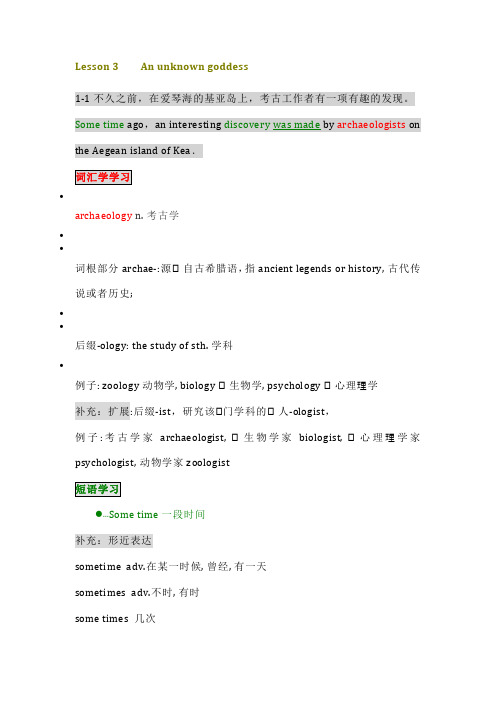
•archaeology n. 考古学••词根部分archae-:源⾃自古希腊语,指ancient legends or history, 古代传说或者历史;••后缀-ology: the study of sth. 学科•●∙∙∙Some time 一段时间补充:形近表达sometime adv.在某一时候, 曾经, 有一天sometimes adv.不时, 有时some times 几次•stand(vi.) 此处表示“坐落于”“位于”“(高贵)矗立于” be located in•A great tree stands on the mount. 一棵大树竖立在山上。
There is a temple standing on the top of the mountain. 山顶上有座寺庙。
A row of willows stands on the riverside. 河边长着一排柳树。
补充:同义表达lie (vi.) ; situate(vt.); Locate(vt.) 使...坐落于, 位于which stands in... = which lies in… = which is located in… = which is situated in...补充:stand其他用法Stand 做动词还可以表示“身高”。
She stands 1.75m. 她身高1.75米She stood three feet high and her hands rested on her hips. 她身高三英尺,双手叉腰。
1-3 这座古城肯定一度很繁荣,因为它曾享有高度的文明,The city at one time must have been prosperous,{for it enjoyed a high level of civilization}.生词学习●∙∙∙prosperous adj. (经济上)繁荣的,昌盛的Our finance is prosperous. 我们的经济非常的繁荣。
精通版四年级英语上册Lesson3__参考教案__

Lesson3 参考教案教学目标1.语言知识:能听懂、会说、会认读单词boy、 girl;听、说、读、写单词brother、sister。
2.语言技能:会用句型Who’s this boy/ girl? He/ She is…3.情感态度:拓展思维,激发并强化学生的学习兴趣。
能在小组活动中积极与他人合作,相互帮助,共同完成学习任务,享受学习的乐趣。
4.学习策略:培养学生在完成任务过程中积极与他人合作的能力。
5.教学方法:任务型教学法、反馈教学法、全身反应法、情景交际法。
6.教学重、难点分析能听懂,会说What’s this boy/ girl? He/ She is…并把词汇溶入句子中进行学习操练。
教学过程:Step 1 Warming up1.Greetings between T and Ss.2.表演第二节课内容。
一方面很快地让学生集中注意力,调动了他们的学习积极性,另一方面也为本课学习作了一个铺垫。
Step 2 Presentation and practiceNew words1.CAI lead in.2.Teach: 出示男孩,女孩和学生图片课件,对单词boy, girl和student进行学习。
3.Game: —Who’s this boy/ girl? —He/ She is…通过这个游戏巩固学生对两个新授单词的掌握情况,也进一步复习学生学过的单词,为后面的对话练习做好铺垫。
4.Pair work5.Act out.通过情景引出对话,然后通过不同形式的反复朗读,充分体现语言的习得过程。
同座合作,组编对话,给学生思维提供发散的平台。
6.Let’s play.通过这个环节可以让学生放松一下,并且调动一下学生的积极性,还可以复习一下以前学过的内容。
7.课件展示。
巩固复习本节课所学内容。
Step 3 Summary在课结束时,老师对同学们的课堂表现和情况进行总结评比,让学生充分体验成功的喜悦,进一步树立学好英语的自信心。
《Lesson 3》 导学案
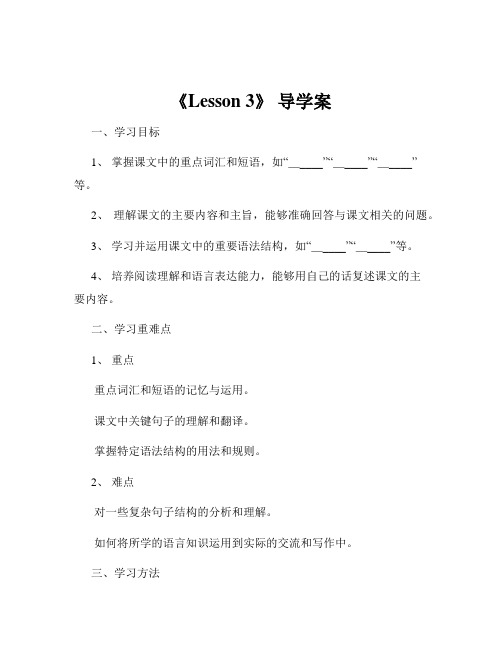
《Lesson 3》导学案一、学习目标1、掌握课文中的重点词汇和短语,如“_____”“_____”“_____”等。
2、理解课文的主要内容和主旨,能够准确回答与课文相关的问题。
3、学习并运用课文中的重要语法结构,如“_____”“_____”等。
4、培养阅读理解和语言表达能力,能够用自己的话复述课文的主要内容。
二、学习重难点1、重点重点词汇和短语的记忆与运用。
课文中关键句子的理解和翻译。
掌握特定语法结构的用法和规则。
2、难点对一些复杂句子结构的分析和理解。
如何将所学的语言知识运用到实际的交流和写作中。
三、学习方法1、预习通读课文,标注出生词和不理解的地方。
查阅词典,了解生词的含义和用法。
2、课堂学习认真听讲,跟随老师的思路理解课文。
积极参与课堂互动,回答问题,与同学进行讨论。
3、复习复习重点词汇、短语和语法。
完成课后练习题,巩固所学知识。
四、知识链接回顾之前所学的相关知识,如与本课主题相关的词汇、语法等,为学习新课做好铺垫。
五、学习过程1、导入通过一个与课文主题相关的小故事、问题或图片等,引起学生的兴趣,导入新课。
2、词汇学习教师讲解重点词汇的发音、拼写、词义和用法。
学生跟读、背诵词汇,并进行简单的词汇练习。
3、课文阅读学生第一次阅读课文,了解大致内容。
教师提出一些引导性问题,帮助学生理解课文的主要情节。
4、语法讲解结合课文中的句子,讲解重要的语法结构。
通过例句和练习,让学生掌握语法的用法。
5、课文精读学生再次仔细阅读课文,理解细节内容。
教师针对课文中的难点进行详细讲解和分析。
6、小组讨论学生分组讨论与课文相关的问题,如人物性格、主题意义等。
每组选派代表进行发言,分享讨论结果。
7、课堂总结教师总结课文的重点内容、语法知识和学生的表现。
强调重点和难点,布置课后作业。
六、课后作业1、背诵课文中的重点段落。
2、用所学的词汇和语法结构写一篇短文。
3、完成课本上的练习题。
七、拓展阅读推荐一些与本课主题相关的课外阅读材料,如文章、书籍等,拓宽学生的知识面和阅读量。
新概念一册lesson3

sorry
int.<感叹词>对不起 adj.<形容词>对不起的,遗憾的,难过的 Sorry=I'm sorry. Iam sorry to hear[hɪə(r)] that. 听到此事我很难过。
没关系。
That's all right. It doesn't matter. Never mind.
Read the text by yourself. Then let's do the role play!
Does this man get his umbrella?
My coat and my umbrella please. Here is my ticket.
Thank you , sir. Number five. Here’s your umbrella and your coat.
This is not my umbrella. Sorry, sir.
New words and expressions
umbrella
please
here
my
ticket
number
five
sorry
sir
cloakroom
sun umbrella
folding umbrella [ˈfəʊldɪŋ]
a or an?
一把伞 an umbrella一把Biblioteka 阳伞 a sun umbrella
一把折叠伞 a folding umbrella
apple pencil orange ticket house uncle coat
please
int.<感叹词>请 礼貌用语,用于请求或要求别人做某事
新概念英语Lesson 3 课文讲解
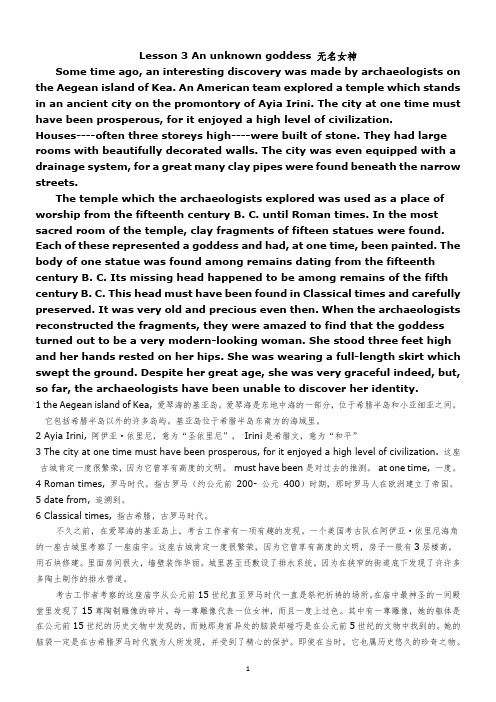
Lesson 3 An unknown goddess 无名女神Some time ago, an interesting discovery was made by archaeologists on the Aegean island of Kea. An American team explored a temple which stands in an ancient city on the promontory of Ayia Irini. The city at one time must have been prosperous, for it enjoyed a high level of civilization.Houses----often three storeys high----were built of stone. They had large rooms with beautifully decorated walls. The city was even equipped with a drainage system, for a great many clay pipes were found beneath the narrow streets.The temple which the archaeologists explored was used as a place of worship from the fifteenth century B. C. until Roman times. In the most sacred room of the temple, clay fragments of fifteen statues were found. Each of these represented a goddess and had, at one time, been painted. The body of one statue was found among remains dating from the fifteenth century B. C. Its missing head happened to be among remains of the fifth century B. C. This head must have been found in Classical times and carefully preserved. It was very old and precious even then. When the archaeologists reconstructed the fragments, they were amazed to find that the goddess turned out to be a very modern-looking woman. She stood three feet high and her hands rested on her hips. She was wearing a full-length skirt which swept the ground. Despite her great age, she was very graceful indeed, but, so far, the archaeologists have been unable to discover her identity.1 the Aegean island of Kea, 爱琴海的基亚岛。
新概念英语lesson3课文
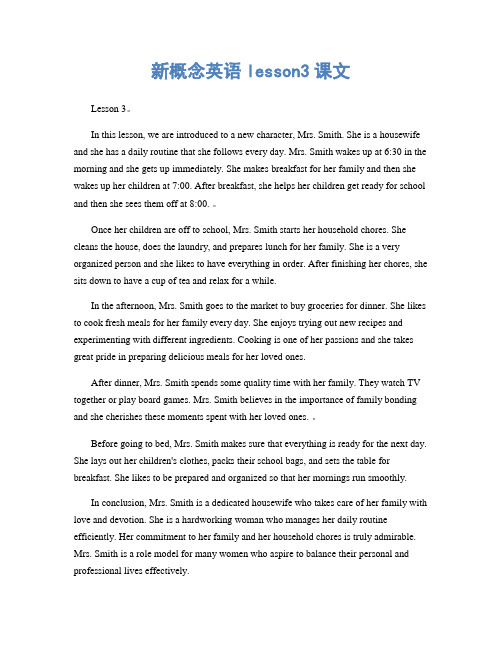
新概念英语lesson3课文Lesson 3。
In this lesson, we are introduced to a new character, Mrs. Smith. She is a housewife and she has a daily routine that she follows every day. Mrs. Smith wakes up at 6:30 in the morning and she gets up immediately. She makes breakfast for her family and then she wakes up her children at 7:00. After breakfast, she helps her children get ready for school and then she sees them off at 8:00. 。
Once her children are off to school, Mrs. Smith starts her household chores. She cleans the house, does the laundry, and prepares lunch for her family. She is a very organized person and she likes to have everything in order. After finishing her chores, she sits down to have a cup of tea and relax for a while.In the afternoon, Mrs. Smith goes to the market to buy groceries for dinner. She likes to cook fresh meals for her family every day. She enjoys trying out new recipes and experimenting with different ingredients. Cooking is one of her passions and she takes great pride in preparing delicious meals for her loved ones.After dinner, Mrs. Smith spends some quality time with her family. They watch TV together or play board games. Mrs. Smith believes in the importance of family bonding and she cherishes these moments spent with her loved ones. 。
- 1、下载文档前请自行甄别文档内容的完整性,平台不提供额外的编辑、内容补充、找答案等附加服务。
- 2、"仅部分预览"的文档,不可在线预览部分如存在完整性等问题,可反馈申请退款(可完整预览的文档不适用该条件!)。
- 3、如文档侵犯您的权益,请联系客服反馈,我们会尽快为您处理(人工客服工作时间:9:00-18:30)。
lesson 3
1.spoil vt.破坏即可用人又可用物:虫子worm. . . 摇滚乐rock-and-roll搅得我心神不宁.
2.went to , visit 的区别事实上是_______动词与______动词的区别及物动词后面直
接跟________ 不及物动词就是_______跟名词上个星期天他们来我家.(用两种方法)3.不及物
动词的用法:不跟名词他每天跑步. 我每年都旅游. 后面可以+状语. 后面有名词一定要
加介词: .Tom坐在椅子上.Mary站在桥下. 林平躺在阳光下. 不及物动词与及物动词的区别他看着我. 我看见了他. 4.friendly是____. 形容词在句子中做定语和表语一只友好的小猫. 他非常友好.5.
可数名词不能单独存在总是以单数______和复数形式出现______a few 一些, 几个只能修饰______:
几个人,几本书,几只笔 .几个苹果,几个假期, 6.双宾语有些动词后面可以跟两个宾语一个人一个物人在前不加介
词, 物在前物与人之间要加介词: . 他借给我10块. 我递给他一本英
语小说novel. 我送给他一个生日卡.show .(都用两种方法)7.lend 借出, borrow 借进怎样看借进借出? 看主语上个礼拜他说我借了他的钱但是我记不起来了. 我记得我借给他十块钱.lend 后面跟双宾语我借给他一笔a sum of 钱.(用两种方法)borrow 不能用双宾语我借了他一笔钱.(用两种方法)8. 当物做代词的时候,不能放在___后面
Please pass me it.改错这双鞋不错,你就帮你的女朋友把它买下吧.9. then adv. 不能连接句子and then=_____于是, 然后, 那么,那时,他听说我没买月饼moon cake于是他就送给我一盒。
(用两种方法)这个男人是昨天下午4点钟死的,你那时在做什么?,
..昨下午天我坐在电影院的旁边.一个热心的
我在小女孩的后面看见我的老同学去年暑假他借了我一万块
钱..
双宾语____个宾语,一个是_______,另一个是_____ 这课学介词to ,这些动词是给___发送____递_____教_____显示
______ 他教了我几个中国字. 我们给他发了邮件.
我递给她几张邮票..(都用两种方法)
1. 看的用法,他正在看书. 我们每天都看报纸.,你必须去看病。
我看见他了,但他并没有看见我。
我每晚都看电视,但
昨晚没看.上个星期六我们全家都看足球比赛,但星期天没有看.他看着我. 英语陈述句有简单句, 主从复合句, 并列句就是两个句子有一个并列连词连接在一起and 他走进来我马上就离开了.昨天我走进了一家新旅
店一个友好的侍者给我递上一杯水. but 他给我打招呼,但是我不认识他.我对他说了许多, .你说今天
会繁星满天,我却没看到一颗星星. 3. 时间状语every day可以用于_____,______ .但是
. On只要有日期一律用介词on, 在一个暴风雨的晚上, 一个多雾fogy的早上, 4.过去时的否定
式一律加didn't 加了助动词动词____. 小明昨天没来. 去年我没去旅游.他想锻炼身体但
5. think about (of)与think的区别我考虑工作的事情. .
6.
pass 的用法: vt vi 昨天我路过你家. 三个小时过去了.递(跟双宾语).(双宾语).quickly 在形容词的后面+ly 构成____词修饰_____词careful_____quiet_____,7.make a decision to do sth. 去
.8. spend 花时间,钱只能用___做主语我花了10个小时学英语.他买这套西装用了100圆。
花时间后面只能用介词___我用了十分钟解这道题.花钱可以用on , for 他花了十万圆买下这间稻草straw 房.跟动词只能用_____昨天我花了一个晚上写了二十一封信.9.whole放在冠词的____整个村子, 一整天,与all的区别all 放在冠词的前面整个城市_____,whole放在冠词的_____ 整个世界____ 我用了一整年写出了这本书.10.single单一的,唯一的, 我一大早就来到广场,但是没有看见一个人.请给我一张去香港的
去年夏天我去法国,我造访了巴黎的歌剧院。
我站在歌剧院前,一个热心的巴黎市民citizen教了我几句法语单词。
他
去,在最后一天,我下定决心,一清早我就爬起来买了40个信封envelop,准备写好发出去,但最后没写一个字。
